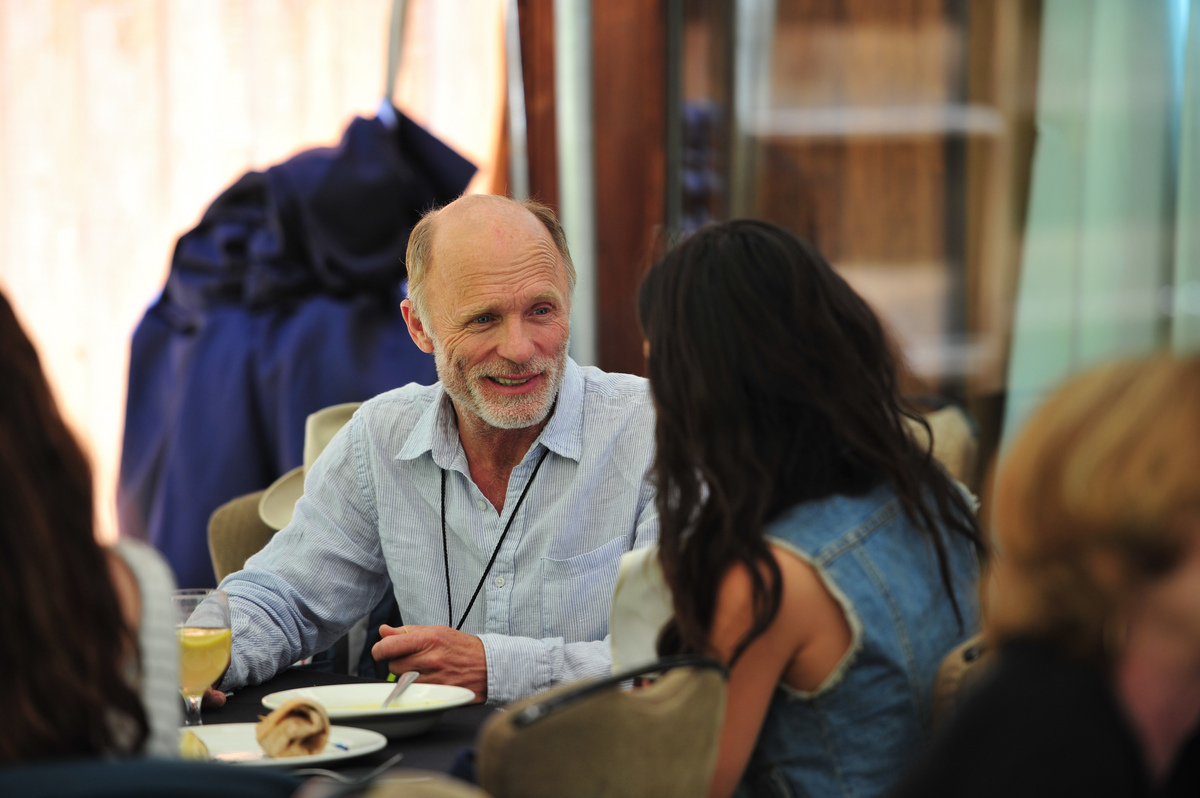Ed Harris (left) shares his ideas with Chloe Zhao at the 2012 Directors Lab at the Sundance Institute.
By Vanessa Zimmer
Famed director Agnieszka Holland (Europa Europa, Angry Harvest) was on the phone. She had called Ed Harris to ask him to play Beethoven in her film Copying Beethoven.
“You gotta be kidding,” chuckles Harris, years after the call. “To me, that’s like me playing Einstein. It’s just not natural.”
Holland was insistent: No, Ed, you can do this.
Obviously, the movie having been released in 2006, Harris agreed. But, of course, there’s more to the story. In a Sundance Institute Conversation From the Labs session in 2020, Harris told the rest of that story and many more, all in a gracious and generous effort to explain what works for him to emerging filmmakers. The acclaimed veteran actor and director has served as a creative advisor at the Sundance Labs for more than 15 years.
From his breakthrough in 1983’s The Right Stuff, to a turn as Atticus Finch in Broadway’s To Kill a Mockingbird, to his current role on television’s Westworld, Harris has established himself among the most talented and accomplished actors of this generation. He earned Oscar nominations for his performances in Apollo 13, The Truman Show, Pollock, and The Hours. He also directed Pollock and Appaloosa, guiding Marcia Gay Harden to a best supporting actress Oscar in the former.
“
Being afraid of, having a fear about a certain role, I think is great.”
Ed Harris
Harris uses the word “inhabit” frequently when he talks about his approach to acting. He asks himself: What part of myself do I need to explore or cultivate to play this role? “If there is some of the essence of me that is in this character, what do I have to do to allow that character to inhabit me?”
Often, that involves filling one’s head up with the life and details of the character, especially a person who actually existed, “so that it’s there and a part of you, a part of your being.” In the case of Beethoven, Harris spent nine months taking piano lessons. He took conducting lessons. He listened to all of the composer’s music. He read about him. He gained maybe 30 pounds to better resemble him.
Although that part was probably the most daunting of his more than 75 film roles, he says, he broke it down into a step-by-step process that made the man, Beethoven, seem not so distant. “Being afraid of, having a fear about a certain role, I think is great,” Harris adds. “That’s exciting to me… That’s when you start learning, you start really challenging yourself.”
Harris followed a similar path with Pollock, the 2000 film about artist Jackson Pollock, in which he not only played the lead but also directed. From the time his father sent him a book on the abstract expressionist in 1985, to the filming in 1999, Harris delved deeply into written materials, built an art studio, and learned to paint.
“It wasn’t so much me penetrating him as he penetrated me,” says Harris. “He was a man uncomfortable in being in the world.” That’s how Harris felt early in his career, with no social life to speak of and laser-focused on acting. “[Pollock] was a man who learned to be in the world… and found a way to express himself and be free when he was painting.” The actor/director found that inspiring.
“
You have to really care about your actors. You don’t have to coddle them. But you’ve got to let them know you’ve got their back.”
Ed Harris
As for directing, Harris believes the best directors are teachers — and that the key elements to the actor-director relationship are honesty and respect. He strives to build trust in the dynamic. “You have to really care about your actors,” he says. “You don’t have to coddle them. But you’ve got to let them know you’ve got their back.”
That means finding out how they like to work, for example, and not allowing technical issues — like an equipment breakdown or tinkering with the lighting — to make them wait around the set, losing focus and energy.
A good director, Harris emphasizes, helps actors overcome any barriers to inhabiting their character and delivering the “truth” of that character. Moreover, he or she should demand it.
“You can shoot the most beautiful film in the world — it can be beautifully edited, it can be shot beautifully — (but) if your actors don’t bring you the truth of the matter, who gives a fuck?”
He advises actors to be conscious only of the scene — everything outside of that scene should be invisible. When you emerge from a scene feeling good about it, but you don’t quite recall how you achieved it, that’s another good sign.
“I really enjoy what I do,” Harris says. “And the more challenging it is, the more difficult it is, to hit a certain note or get to a certain place, the more fun it is for me. The more challenging it is, the more I feel like I have accomplished something.”
To listen to the entire 90-minute Conversations From the Labs: Ed Harris on Acting and Directing, with more practical tips and more glimpses into the award-winning filmmaker’s personality, click here. Sign up by September 1 for Directing Actors, a self-paced introductory course, by clicking here.

Everyone Is Cordially Invited to Celebrate Queer Joy in “The Wedding Banquet”

“The Ugly Stepsister”: A Cinderella Body Horror Story That Will Leave a Crowd in Shambles





